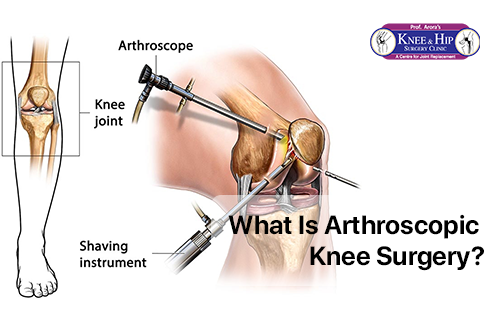
Arthroscopic knee surgery is a minimally invasive procedure that helps diagnose and treat problems inside the knee using a small camera and surgical tools inserted through tiny incisions. It's commonly used for treating torn ligaments, cartilage issues, and knee pain caused by injury or wear and tear.
What Is Arthroscopic Knee Surgery?
Arthroscopic knee surgery is a type of keyhole surgery where a surgeon inserts a tiny camera (arthroscope) into the knee joint to inspect or repair damage. It's performed through small cuts, which results in faster recovery, less pain, and minimal scarring compared to open surgery.
When Is Arthroscopic Knee Surgery Needed?
You may need arthroscopic knee surgery if you experience:
- Persistent knee pain or swelling
- Meniscus tear (cartilage injury)
- Torn ligaments (ACL or PCL)
- Damaged cartilage or bone fragments
- Synovitis (inflammation of knee lining)
- Patellar (kneecap) problems
- Knee infections or cysts (like Baker's cyst)
Joint Replacement Delhi specializes in arthroscopic treatments, especially for patients dealing with sports injuries and age-related knee conditions.
Common Conditions Treated With Arthroscopy
| Condition Treated | Explanation |
|---|---|
| ACL Tear | Repair of the anterior cruciate ligament |
| Meniscus Tear | Trimming or stitching of torn cartilage |
| Synovitis | Removal of inflamed tissue covering knee |
| Patellar Mal-tracking | Realignment of kneecap |
| Loose Bone/Cartilage | Removal of floating fragments |
| Baker’s Cyst | Draining/removal of fluid-filled cyst |
Best Arthroscopic Knee Surgeon
 1.png)
Dr. (Prof) Anil Arora
Vice Chairman & Head of Department Orthopaedics & Joint Replacement Surgery, Max Super Speciality Hospital, Patparganj, Delhi Chairman & Chief Surgeon, Prof. Arora's Knee & Hip Surgery Clinics, NCR
Education & Training:
- DNB in Orthopaedics from National Board of Examinations
- MS in Orthopaedics from Dr. SN Medical College, Jodhpur
Hospital: Max Super Specialty Hospital
Clinic: Prof. Arora’s Knee & Hip Surgery Clinics, Delhi NCR
Experience: 33+ Years
- Commonwealth Academic Staff Fellowship in Primary, Complex & Revision Joint Replacement Surgery: Royal National Orthopaedic Hospital - Stanmore, London (UK)
- Professor at University College of Medical Sciences & GTB Hospital, New Delhi
- Assistant Professor at Dr SN Medical College & Mahatma Gandhi Hospital, Jodhpur
- Senior Resident at University College of Medical Sciences & GTB Hospital, New Delhi
Specialty: Orthopaedic Joint Replacement (Robotic Knee & Hip Replacement) Max Super Specialty Hospital
About: Prof. Arora, Guinness world record holder and Limca book of records holder, is a Senior Robotic Total Knee & Hip Replacement surgeon. He is an Internationally known figure in Orthopedics and joint replacement. He has been performing joint replacements since 1988, experience of more than 33 years and 12,000 Knee & Hip Replacement surgeries. Teaching in medical college and training Orthopedic surgeons has provided him with vast surgical and clinical experience and expertise. He has wide-ranging skills in knee and hip replacement surgeries. He is known for his sound clinical judgment and fine surgical skills. He was the first surgeon to start pinless computer navigated total knee replacements in north India. He is regularly performing primary, complex and revision (Robotic & pinless computer navigated) knee and hip replacement surgeries. He is also performing primary and revision elbow and shoulder replacements. He is the immediate past president of Delhi Orthopedic association.
How Is Arthroscopic Knee Surgery Done?
Here's a step-by-step overview of the procedure:
- Anesthesia is given (spinal or general).
- The surgeon makes small incisions near the knee.
- An arthroscope (camera) is inserted to view the joint.
- Surgical tools are used to repair or remove damaged tissue.
- Incisions are closed with stitches or adhesive strips.
Duration: Usually completed within 30 minutes to 1 hour.
Hospital Stay: Most patients go home the same day.
What to Expect Before and After Surgery
Before Surgery:
- Consultation with your orthopedic specialist
- Pre-op tests (X-ray/MRI)
- Fasting for a few hours before surgery
- Pausing certain medications if needed
After Surgery:
- Bandaged knee and mild pain/swelling
- Rest and elevation to reduce swelling
- Start gentle physiotherapy within a few days
- Resume daily activities in 1-2 weeks (depending on case)
At Joint Replacement Delhi, patients are guided by experienced physiotherapists during recovery to ensure the best outcomes.
Benefits of Arthroscopic Knee Surgery
Why choose arthroscopic surgery? Here's what makes it a preferred option:
- Smaller incisions
- Faster healing and recovery
- Less pain and scarring
- Lower risk of infection
- Return to normal activities sooner
Especially in Delhi, patients prefer Joint Replacement Delhi for its advanced arthroscopy techniques, expert surgeons, and patient-centric approach.
Are There Any Risks?
While arthroscopic knee surgery is generally safe, there can be some rare risks:
- Infection at the incision site
- Blood clots
- Knee stiffness
- Temporary swelling or discomfort
- Reaction to anesthesia
Choosing an experienced clinic like Joint Replacement Delhi significantly reduces the chance of complications.
Arthroscopic Knee Surgery Cost in Delhi
The cost of arthroscopic knee surgery in Delhi typically depends on:
| Cost Factor | Details |
|---|---|
| Procedure Type | Debridement vs. ligament repair/ reconstruction |
| Anesthesia | Spinal vs. general |
| Hospital Stay | Daycare or overnight |
| Diagnostic Tests | X-ray, MRI, blood tests |
| Surgeon's Experience | Expertise and hospital facilities |
At Joint Replacement Delhi, costs are affordable, and support is available for insurance claims and EMI options.
FAQs for Arthroscopic Knee Surgery
Recovery typically takes 1 to 3 weeks for basic procedures and up to 6 weeks for more complex repairs. Physical therapy helps speed up the healing process.
The procedure itself is not painful due to anesthesia. After surgery, mild pain or discomfort is common and can be managed with medication and rest.
Yes, most patients can walk with support the same or next day. Full walking without support usually resumes in 1–2 weeks.
If you're searching for reliable, advanced treatment for your knee problems, Joint Replacement Delhi offers:
- Highly experienced surgeons like Dr. Anil Arora
- Latest arthroscopic technology
- Fast-track recovery programs
- Personalized post-surgery care
Thousands of patients trust Joint Replacement Delhi for their pain-free, active lifestyle after surgery.




